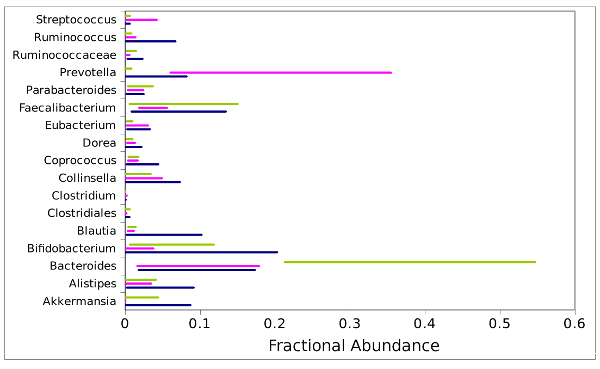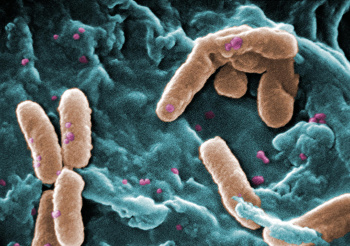
Gut Bacteria
April 22, 2011 There's an old saying that you are what you eat. It's attributed to the eighteenth/nineteenth century French gastronome Jean Anthelme Brillat-Savarin. My interpretation of this expression, which differs from the usual healthy foods interpretation, is that of caste distinction. People with more money will eat different foods than the meat-and-potato plebeians. When we eat, we aren't eating just for ourselves. Gut bacteria, more poetically named "gut flora," are the bacteria that inhabit our intestines. This isn't a pathological condition, it's normal. In fact, there are ten times as many bacterial cells in our bodies as our own human cells. The total weight of this bacterial load is about 1.5 kilograms (3.3 pounds). Not surprisingly, nearly all these bacteria are anaerobic. There is much evidence that these bacteria perform useful functions, a list of which appears on Wikipedia.[1]• Fermenting food material.scientific study, and a recent paper in Nature examines the idea that your flora may differ significantly from your neighbor's. [2-7] This research shows that humans host intestinal flora systems of three different types. The huge research team that performed this study (with eighty-six authors, two of which are other research groups) examined gene sequences of faecal material (or fecal; yes, they studied poop) for twenty-two individuals from four countries (Denmark, France, Italy and Spain). They combined these data with extant datasets of thirteen Japanese and four Americans.[3] They found that the bacteria clumped into three distinct categories, which they conclude are balanced host–microbial symbiotic states; that is, these are equilibrium states.[2] One possible explanation of this is that a particular intestinal bacterial ecosystem is established randomly, early in life, and it persists.[3] The categories did not correlate with an individual's properties, such as body mass index, age, or gender.[2] However, twelve of the bacterial genes significantly correlate with age. The authors also state that three "functional modules" correlate with with body mass index, which might indicate a diagnostic potential for microbial markers. Bacteria of the first enterotype (category) encourage production of more vitamin B7 (biotin), and the second enterotype 2, more vitamin B1 (thiamine).[3] As can be seen in the following figure, produced with data from the Nature study, two of the three groups were well marked by their abundance of Bacteroides and Prevotella.
• Training the immune system.
• Preventing growth of pathogenic bacteria.
• Regulating gut development.
• Producing vitamins, such as biotin (B7) and vitamin K.
• Producing hormones that direct the body to store fats.
 Fractional abundance of some gut bacteria, showing minimum and maximum levels in the three populations. (Plot via Gnumeric)
The authors admit that their published sample size is small, and that the studied individuals are all from industrial nations with somewhat similar diets. They have, however, confirmed their findings in an expanded study of 400 people[3] which includes 85 Danes and 254 Americans.[6]
Nowadays, everyone asks what's the payoff in scientific research. Yoghurt companies, who advertise the benefits of their probiotics, are said to be very interested in these results.[5] According to one market source, yoghurt consumption in Western Europe is about 65 pounds/person/year and about twelve pounds/person/year in the US.[8]
You may have noticed that I wrote "yoghurt" instead of "yogurt." My family was eating yoghurt long before it became fashionable in the US, and that's the way it was spelled in yesteryear. This is a lot like the sulphur/sulfur wars I wrote about in a previous article (Van Gogh Versus the Sulfates, March 1, 2011).
The word, yogurt, gets 36,500,000 Google results, while the word, yoghurt, gets only 9,860,000. By the way, I also used to write catsup (1,350,000 Google results) instead of ketchup (18,300,000 Google results).
Fractional abundance of some gut bacteria, showing minimum and maximum levels in the three populations. (Plot via Gnumeric)
The authors admit that their published sample size is small, and that the studied individuals are all from industrial nations with somewhat similar diets. They have, however, confirmed their findings in an expanded study of 400 people[3] which includes 85 Danes and 254 Americans.[6]
Nowadays, everyone asks what's the payoff in scientific research. Yoghurt companies, who advertise the benefits of their probiotics, are said to be very interested in these results.[5] According to one market source, yoghurt consumption in Western Europe is about 65 pounds/person/year and about twelve pounds/person/year in the US.[8]
You may have noticed that I wrote "yoghurt" instead of "yogurt." My family was eating yoghurt long before it became fashionable in the US, and that's the way it was spelled in yesteryear. This is a lot like the sulphur/sulfur wars I wrote about in a previous article (Van Gogh Versus the Sulfates, March 1, 2011).
The word, yogurt, gets 36,500,000 Google results, while the word, yoghurt, gets only 9,860,000. By the way, I also used to write catsup (1,350,000 Google results) instead of ketchup (18,300,000 Google results).
References:
- Gut Bacteria page on Wikipedia.
- Manimozhiyan Arumugam, Jeroen Raes, Eric Pelletier, Denis Le Paslier, Takuji Yamada, Daniel R. Mende, Gabriel R. Fernandes, Julien Tap, Thomas Bruls, Jean-Michel Batto, Marcelo Bertalan, Natalia Borruel, Francesc Casellas, Leyden Fernandez, Laurent Gautier, Torben Hansen, Masahira Hattori, Tetsuya Hayashi, Michiel Kleerebezem, Ken Kurokawa, Marion Leclerc, Florence Levenez, Chaysavanh Manichanh, H. Bjorn Nielsen, Trine Nielsen, Nicolas Pons, Julie Poulain, Junjie Qin, Thomas Sicheritz-Ponten, Sebastian Tims, David Torrents, Edgardo Ugarte, Erwin G. Zoetendal, Jun Wang, Francisco Guarner, Oluf Pedersen, Willem M. de Vos, Søren Brunak, Joel Doré, MetaHIT Consortium, Jean Weissenbach, S. Dusko Ehrlich, Peer Bork, MetaHIT Consortium (additional members), María Antolín,26, Francois Artiguenave, Hervé M. Blottiere, Mathieu Almeida, Christian Brechot, Carlos Cara, Christian Chervaux, Antonella Cultrone, Christine Delorme, Gérard Denariaz, Rozenn Dervyn, Konrad U. Foerstner, Carsten Friss, Maarten van de Guchte, Eric Guedon, Florence Haimet, Wolfgang Huber, Johan van Hylckama-Vlieg, Alexandre Jamet, Catherine Juste, Ghalia Kaci, Jan Knol, Omar Lakhdari, Severine Layec, Karine Le Roux, Emmanuelle Maguin, Alexandre Mérieux, Raquel Melo Minardi, Christine M'rini, Jean Muller, Raish Oozeer, Julian Parkhill, Pierre Renault, Maria Rescigno, Nicolas Sanchez, Shinichi Sunagawa, Antonio Torrejon, Keith Turner, Gaetana Vandemeulebrouck, Encarna Varela, Yohanan Winogradsky and Georg Zeller, "Enterotypes of the human gut microbiome," Nature, vol. 472, no. 7343 ( April 21, 2011)
- Carl Zimmer, "Bacteria Divide People Into 3 Types, Scientists Say," New York Times, April 20, 2011.
- Brandon Keim, "Gut-Bacteria Mapping Finds Three Global Varieties," Wired, April 20, 2011
- By Eryn Brown, "Gut microbes: What's your type?" Los Angeles Times, April 20, 2011
- Cecile Vannucci, "Human Gut Check Finds Bacteria Sorted in Ways That May Aid in Treatments," Bloomberg News, April 20, 2011
- Science Blog, "What's your intestinal bacteria type?" April 20, 2011.
- David Jones and Brad Dorfman, "Danone: U.S. yogurt consumption to double," Reuters, March 16, 2010.
- Manimozhiyan Arumugam, Jeroen Raes, Eric Pelletier, Denis Le Paslier, Takuji Yamada, Daniel R. Mende, Gabriel R. Fernandes, Julien Tap, Thomas Bruls, Jean-Michel Batto, Marcelo Bertalan, Natalia Borruel, Francesc Casellas, Leyden Fernandez, Laurent Gautier, Torben Hansen, Masahira Hattori, Tetsuya Hayashi, Michiel Kleerebezem, Ken Kurokawa, Marion Leclerc, Florence Levenez, Chaysavanh Manichanh, H. Bjorn Nielsen, Trine Nielsen, Nicolas Pons, Julie Poulain, Junjie Qin, Thomas Sicheritz-Ponten, Sebastian Tims, David Torrents, Edgardo Ugarte, Erwin G. Zoetendal, Jun Wang, Francisco Guarner, Oluf Pedersen, Willem M. de Vos, Søren Brunak, Joel Doré, MetaHIT Consortium, Jean Weissenbach, S. Dusko Ehrlich, Peer Bork, MetaHIT Consortium (additional members), María Antolín,26, Francois Artiguenave, Hervé M. Blottiere, Mathieu Almeida, Christian Brechot, Carlos Cara, Christian Chervaux, Antonella Cultrone, Christine Delorme, Gérard Denariaz, Rozenn Dervyn, Konrad U. Foerstner, Carsten Friss, Maarten van de Guchte, Eric Guedon, Florence Haimet, Wolfgang Huber, Johan van Hylckama-Vlieg, Alexandre Jamet, Catherine Juste, Ghalia Kaci, Jan Knol, Omar Lakhdari, Severine Layec, Karine Le Roux, Emmanuelle Maguin, Alexandre Mérieux, Raquel Melo Minardi, Christine M'rini, Jean Muller, Raish Oozeer, Julian Parkhill, Pierre Renault, Maria Rescigno, Nicolas Sanchez, Shinichi Sunagawa, Antonio Torrejon, Keith Turner, Gaetana Vandemeulebrouck, Encarna Varela, Yohanan Winogradsky and Georg Zeller, "Enterotypes of the human gut microbiome," Nature, vol. 472, no. 7343 ( April 21, 2011)
